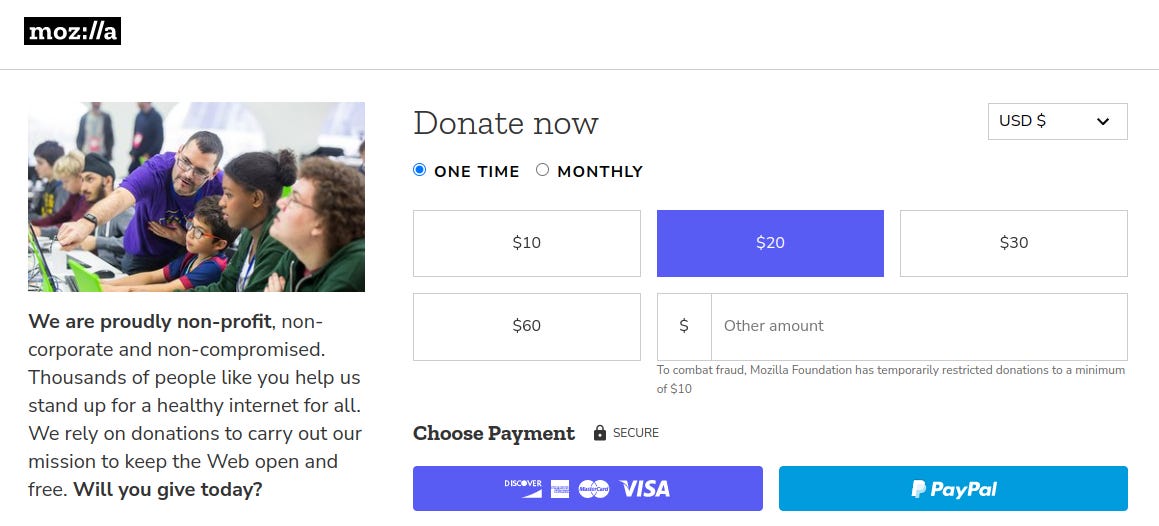This article was originally published in December of 2022, exclusively for subscribers to The Lunduke Journal. It is being re-published now -- free for all -- as the importance of this topic (and the bizarre questions surrounding Mozilla) continues to grow.
Mozilla, the Foundation behind the Firefox web browser, is absolutely mammoth — with over One Billion Dollars in assets.
Where does all that money come from?
Where is it being spent?
With Firefox marketshare in a nosedive, how is Mozilla reacting?
The Lunduke Journal spent some time with Mozilla’s financial disclosures and came away with some wild observations — bizarre expenditures (including to companies that don’t even seem to exist) and political organizations with no relationship to Mozilla’s core business.
There’s a lot here. Read to the end. It gets wild.
What, exactly, is Mozilla?
There seems to be a great deal of confusion about what sort of organization Mozilla actually is. Many seem to be under the impression that it is simply a Non-Profit focused on the development of Firefox. And, while that is partially true, it is only a small part of the much bigger picture.
At the top exists the Mozilla Foundation. A not-for-profit corporation that operates out of California.
The Mozilla Foundation is the sole owner (100%) of two for-profit corporations: Mozilla Corporation and MZLA Technologies Corporation.
Both the parent “Foundation” and the wholly owned “Corporation” are run by the same CEO and Executive Chair: Mitchell Baker.
In fact, the “not-for-profit” and “for-profit” aspects of Mozilla are so tightly intertwined that the auditors report makes a point of calling the collective group of three organizations simply “Mozilla”… and reports on their finances as a single entity.
One other misconception that many have is that Mozilla’s primary focus is the development of the Firefox web browser. That does not appear to be the case. These are the three “Areas of Focus” according to The Mozilla Foundation.

Rally Citizens. Connect Leaders. Shape the Agenda.
A strange set of areas to focus on, as you’ll see.
One other item to remember as we go through these details: Firefox market share has been in a free-fall for some time. Depending on the source, it fluctuates between 3% and 7% of the total web browser market.
How much money does Mozilla have?
As of 2021, Mozilla (including the Foundation and the wholly owned For-Profit Corporations), had total assets worth over $1.1 Billion USD. That’s Billion. With a B.

This includes close to $400 Million in cash. Overall assets jumped by roughly $200 Million over the previous year.
As you would expect with such numbers, Mozilla saw a significant increase in revenue in 2021. Up over $100 Million (to just over $600 Million).

At the same time as total revenue was skyrocketing, overall expenses went way (way) down. By roughly $100 Million. With the deepest cuts being focused in “Software development”.

To put it another way: If Mozilla stopped earning money today… it has enough assets to fund their current expenses for roughly 3 years. Thanks in large part to rising revenue combined with cutting software development work.
Where does that money come from?
If you look at the “Change in Net Assets” chart above, you’ll notice that the vast majority of revenue comes from “Royalties” ($527 Million), with advertising and subscriptions ($56 Million) and Contributions ($7 Million) as the next two largest line items.
“Contributions” is donations from people like you. Mozilla actively seeks donations because, as they put it, “We rely on donations to carry out our mission.”

It is worth noting that this statement is not true.
Mozilla does not, in fact, “rely on donations” to carry out their mission. In fact, if you removed donations from the yearly revenue entirely, it would have no impact on Mozilla’s ability to pay for any of their expenditures. And Mozilla could not pay more than a small fraction of their bills from the yearly donations.
Since “Royalties” makes up such a large percentage of Mozilla revenue, let’s drill into that a little bit. Royalties for what, exactly? According to the Foundation’s 2021 report:
“Royalties - Mozilla provides Firefox web browser, which is a free and open-source web browser initially developed by Mozilla Foundation and the Corporation. Mozilla incorporates search engines of its customers as a default status or an optional status available in the Firefox web browser. Mozilla generally receives royalties at a certain percentage of revenues earned by its customers through their search engines incorporated in the Firefox web browser.”
Got it. Search engine deals. That’s the cash cow. And, while the annual report is light on the details, it does provide this key bit of information…
“Approximately 83% and 86% of Mozilla’s revenues from customers with contracts were derived from one customer for the years ended December 31, 2021 and 2020, respectively. Receivables from that one customer represented 69% and 73% of the December 31, 2021 and 2020 outstanding receivables, respectively.”
In other words: The vast majority (roughly 70%) of all of Mozilla’s yearly revenue comes from default search engine placement of just one customer.
That customer, while not named in the report, is obviously Google (and parent company, Alphabet).
Without that revenue, Mozilla could not continue to operate at their current level of expenditure without eating into their assets.
How much does their leadership earn?
While we’re on the topic of expenditures, it’s worth taking a small detour into the compensation of the Mozilla leadership. From the Mozilla Foundation’s 2021 Form 990:

The head of Mozilla earned roughly $5.6 Million during 2021. The rest of the executive team ranged, more or less, from $100k to $300k.
Interesting to note that the Mozilla CEO earned nearly as much ($5.6 M) as Mozilla received in donations ($7 M).
Also interesting that the CEO received a bonus of nearly $5 Million… considering the precarious position that Mozilla is in (being dependent on a single client continuing to pay for Search Engine placement). Unless there’s a secret deal going on, that looks like a company teetering on the edge to me. Strange to reward a CEO for that sort of future uncertainty.
Where, exactly, does all that money go?
Mozilla is a Billion dollar corporation. While their flagship product is the Firefox Web Browser, the software development needs of Firefox — including manpower, services, and other expenses — do not fully utilize the massive revenue of Mozilla.
Not by a long shot.
Which begs the question… what is all of that money being spent on?
Here is a short sampling, based on available public documentation, of exactly how much money is being spent… and where.
MCKENSIE MACK GROUP

During 2021, Mozilla paid $387 Thousand dollars to someone called “MCKENSIE MACK GROUP.”
“[Mckensie Mack Group] is a change management firm redefining innovation in the white-dominant change management industry.”
From their LinkedIn page, Mckensie Mack Group describes itself thusly: “Black-led and nonbinary-led, MMG is a global social justice organization”.
Mckensie Mack is a public speaker who regularly discusses her anger at “White Colonialism” and her dislike of “CIS” men and women. The “Mckensie Mack” company website blog primarily discusses abortion and Trans related issues.
Why would a company that develops a web browser want to pay her close to half a million dollars (in one year)? That remains unclear. It is, however, worth noting that this is a far larger expense than any of the executive team of Mozilla earn in salary (other than the CEO).
ACTION RESEARCH COLLABORATIVE

$100,000 was paid to an organization listed as “Action Research Collaborative.”
What, exactly, is “Action Research Collaborative”?
That is a surprisingly difficult question to find an answer to, as they have no website whatsoever.
One of the few references to it is in a Cornell newsletter from earlier this year, where one of the founders states that Action Research Collaborative is a “standing institutional home that can support action research projects that bring together researchers, community members and policymakers, to be able to work together and address pressing issues as they arise.”
Which… doesn’t really tell you much of anything. No product or project. No client. No website. Nothing.
That founder, Neil Lewis Jr., appears to have focused his career on “vaccine acceptance”, problems with “white” people, and his theory that “white people” can not be victims of discrimination.
What does this “Action Research Collaborative” actually do? Why would Mozilla need their services and be willing to pay $100,000 for it?
That remains entirely unknown.
While The Lunduke Journal does not like to delve too deeply into the Political Woods (tm), it should be questioned why so much money — possibly millions of dollars donated by individuals who thought they were supporting a web browser — is being funneled into highly political organizations that seem to have no involvement with the World Wide Web, Web Browsers, or any related standards.
Weird Discretionary Spending

$30,000 to “MC Technical Inc.” in 2021. Who are they? Well, they don’t have a website, that’s for sure. The business registry listing is about the only thing of the company that seems to exist. The listed address is someone’s house.
How does a mostly-non-existent company, with no online presence at all (no website, social media, reviews, etc.), get paid $30,000 in “discretionary” money from Mozilla?
That’s just straight up weird.

And then there’s the $375,000 in discretionary spending given to “New Venture Fund.”
According to Influence Watch:
“The New Venture Fund (NVF) is a 501(c)(3) funding and fiscal sponsorship nonprofit that makes grants to left-of-center advocacy and organizing projects and provides incubation services for other left-of-center organizations. The fund focuses primarily on social and environmental change.”
Mozilla, the developer of Firefox, gave $375,000 to a “Fund” that specifically exists to provide money and services for political organizations of one particular “alignment”.
Why? In what way does this help Firefox? Or Firefox users?
So many questions…
The deeper we dig into Mozilla and their financials, the more questions come up.
Why does Mozilla give so much money to political speakers that have no relationship to their core business?
Why does Mozilla seem unconcerned with alienating a large portion of their user base (which is already shrinking)?
Why do some of the recipients of Mozilla money appear to be nothing more than empty shells of companies — not even having a simple website?
Why does Mozilla continue to take donations if it doesn’t need them?
Where does Mozilla spend those donated dollars? Do they go to the strange discretionary spending or political organizations?
With the 70%+ reliance on Google (a competitor) for revenue, why is Mozilla spending money on projects that have no goal of being profitable (and have no relation to their core business)?
What happens when the Google funding goes away? Mozilla appears certain that it never will (based on their spending)…. why is that?
Why is Mozilla decreasing software development funding when development of Firefox is the cash cow?
And that is, literally, the tip of the iceberg.
The Lunduke Journal has sent out numerous questions and requests for comment to organizations listed here (among many others) to find answers. Will any be forthcoming? It will be interesting to see.
August 5th, 2023 Update: To date, no request for clarification or additional details has been answered.















